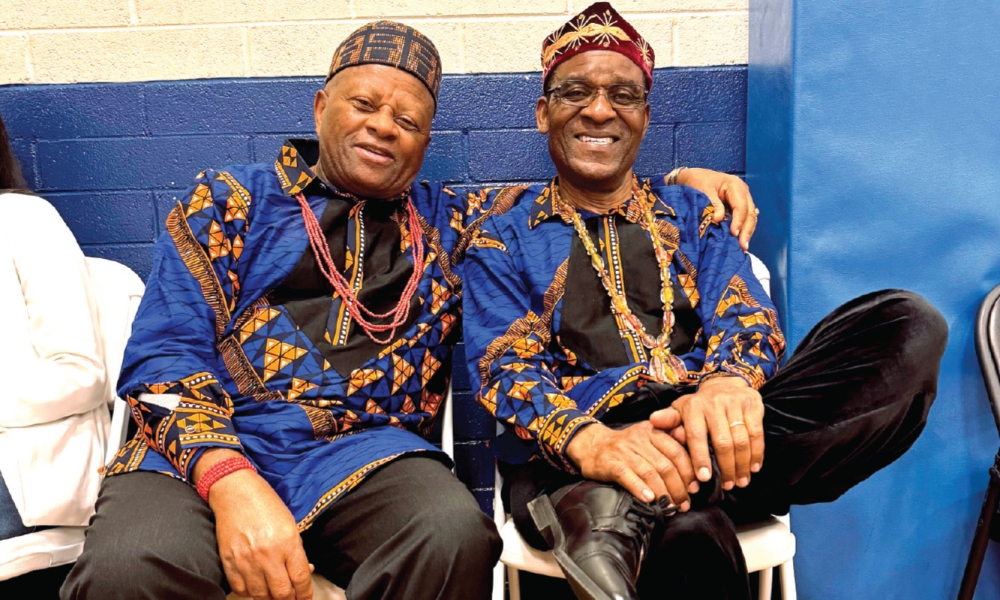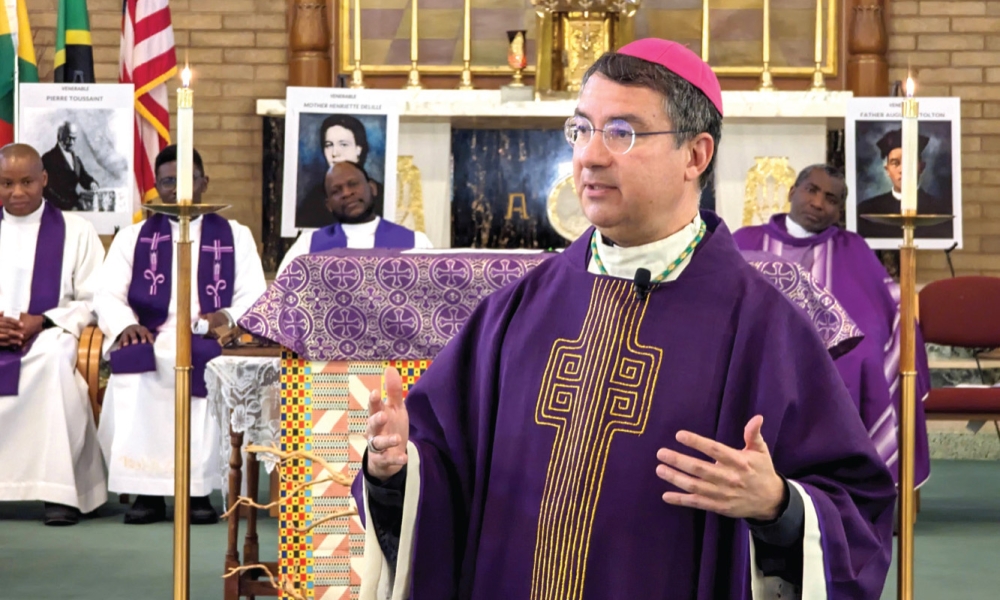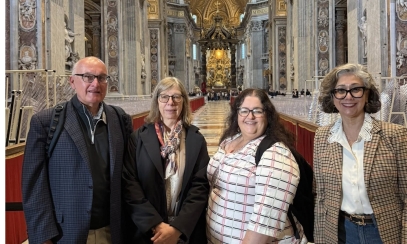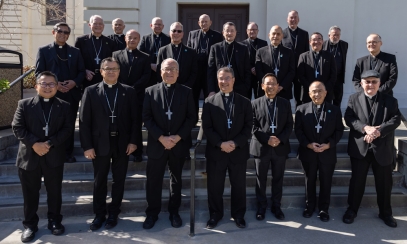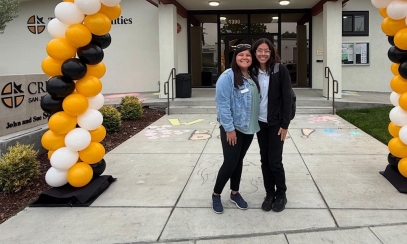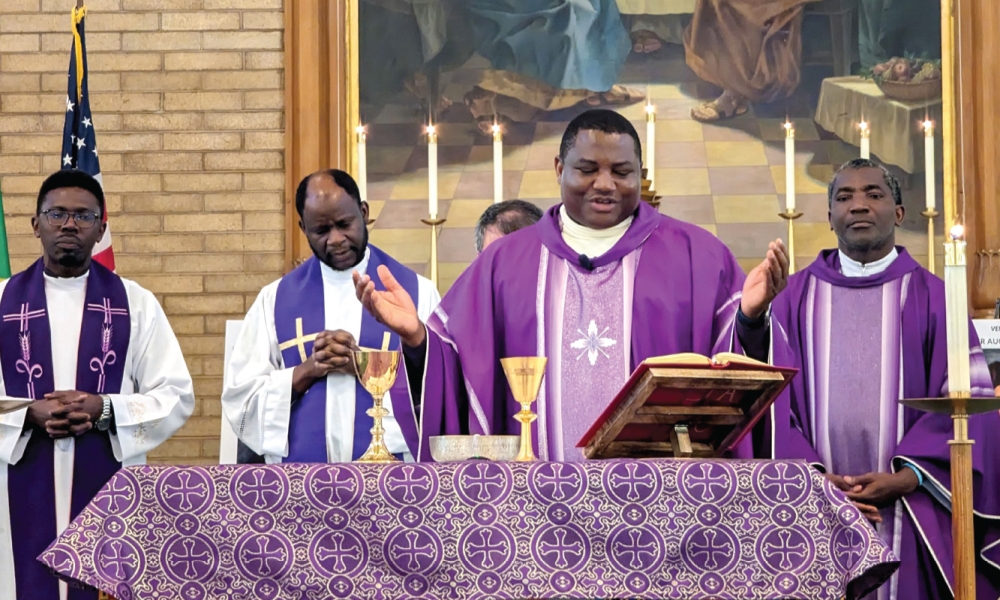
The Gift of a People to God’s People
Of Immigrants and Our Church
Of Immigrants and Our Church
Bishop Cantú, more than ten priests, one deacon, and I presided over the diocesan Black History Month Mass, a colorful assembly enveloped in a vibrant and festive atmosphere. An initial procession of the national flags of over ten African countries, whose nationals were present at the Mass, was accompanied by a brief commentary about each country. Then, other flags were processed, including The United States, Jamaica, Belize, and African Union flags.
Bishop Cantú, more than ten priests, one deacon, and I presided over the diocesan Black History Month Mass, a colorful assembly enveloped in a vibrant and festive atmosphere. An initial procession of the national flags of over ten African countries, whose nationals were present at the Mass, was accompanied by a brief commentary about each country. Then, other flags were processed, including The United States, Jamaica, Belize, and African Union flags.
This annual Mass, celebrated every February, not only acknowledges the history of African American brothers and sisters but also highlights the unique contributions that our vibrant immigrant sisters and brothers from Africa bring to our local Church and our nation. They enrich our community with diverse cultural and traditional expressions of the Faith. These were not immigrants in the sense we think of today, but they nonetheless came from a foreign land and added to the rich tapestry of nations represented in our country today.
Immigrant
The term ‘immigrant,’ often associated with notions of otherness, has unfortunately been tainted as a derogatory label. However, it also signifies the rich diversity and cultural exchange that has shaped our nation and our local Church in San José. It is a term that should be celebrated for the people it describes who collectively contribute to the Faith in a unique way.
This label can diminish the gifts and blessings we all bring and contribute from our diverse life experiences. Our Faith has always been proclaimed in diverse communities. Bishop Cantú, in his homily, spoke powerfully about the need to affirm that each of us, from different backgrounds, brings a unique and valuable gift to each other and the Church, enriching the spiritual formation of those around them.
Drawing from one of his visits to the Holy Land, the Bishop shared, “Our tour group visited Calvary, where Jesus was crucified. It impressed me how both Calvary and Jesus’ Tomb are in the same church: The Church of the Holy Sepulcher; how the mystery of death and the mystery of rising from the dead are both under the same roof.”
Bishop Cantú applied this side-by-side coexistence of death and resurrection as an analogy to the African community in our nation with these words, “I believe this is what so many of our African immigrants, especially those of you of faith, have been able to show us by your spirituality, by your lives, by your music, by your faithfulness; that you are able to teach us that you can hold both of those mysteries, perhaps in tension, but reminding the rest of us that they work together, that they belong under the same roof — the mystery of suffering and dying, but also the glorious mystery of rising from the dead.” As a Nigerian priest, I can attest to being continuously affirmed and resurrected, in a way, by the American culture, which is richly diverse, especially in this area: the Filipino culture, the Vietnamese culture, the Indian culture, the Cantonese and Mandarin Chinese cultures, the Korean culture, and the many other cultures that together weave the beautiful tapestry that makes the firm fabric of our diocese.
The Immigrant as a Blessing
Originally from Texas and the son of an immigrant himself, Bishop Cantú drew once again from his own life experience, sharing how a reverend sister on the panel that interviewed him for the seminary told him during the interview that he was a blessing for the Church because of his background: he spoke two languages and was familiar with two cultures. He could act as a bridge between the Mexican and American communities.
This was a watershed moment in Bishop’s personal life, as he said, “..[T]hat was the first time I had ever heard that being Hispanic was a blessing.” The reality of this slowly sank into the congregation. The bishop noted that it was a bittersweet moment that made him happy but also sad because he had never been told before this interview that being Hispanic was a blessing. Bishop Cantú then spoke powerfully to the congregation, saying: “And so, I want to tell you very clearly that you are a blessing. You are a blessing for the Church. You are a blessing to this country. You have many deep lessons to teach us, and we are blessed that you are here. On behalf of the Church: Thank you.”
At this, there was thunderous applause mixed with celebrative drum and percussion instrument beats. This response was not to exalt the bishop; instead, it was an almost natural response from a people who, through the bishop’s own experience, felt seen, appreciated, and not put in the category of the ‘other.’ All Catholics are called to engage more in their spiritual growth and pastoral contribution to the life of the Church by welcoming the immigrant.
The Invitation to the Whole Pilgrim Church on Earth
The Igbo adage goes: “Gratitude for a heroic act, begets more heroic acts.” Therefore, I say without reservation, adding my voice to that of our lead Shepherd: thank you to all our African brothers and sisters from different communities: The Gambian Community, the Nigerian Igbo Catholic Community, the Swahili Community, the Cameroonian Community, the Congolese Community, the Eritrean Community, and many more. It is truly heroic to celebrate that which is authentically you while offering it as a gift to our local Church.
This ecclesial joy is exactly what was celebrated during the annual diocesan Black History Month Mass. As a diocese, we continue to seek and foster conversations that will promote a more collaborative engagement between cultures, races, and social spheres, especially through our Race and Social Healing committee through the diocesan Office for Life, Justice, and Peace.
Father Angelbert Chikere is the Director of the Office of Life, Justice, and Peace for the Diocese of San José. He assists pastorally at Saint Leo the Great parish, where he lives, and at Saint Martin of Tours parish. He is the temporary chaplain of the local Catholic Cantonese community and a contributing writer to The Valley Catholic.

